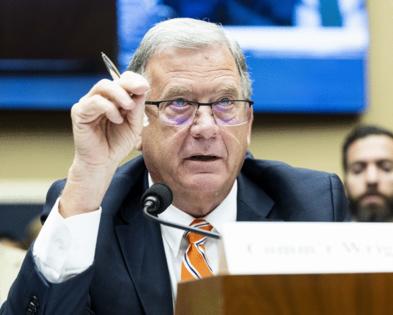NRC commissioners emphasize safety as priority in Senate hearing
Published in News & Features
WASHINGTON — The three remaining members of the Nuclear Regulatory Commission sought to assure the Senate Environment and Public Works Committee on Wednesday that public safety would always be their top priority even as the Trump administration and others push them to speed up the licensing process for nuclear reactors and as they navigate recent staff departures.
At one point during the oversight hearing, Sen. Adam B. Schiff, D-Calif., asked each of the NRC commissioners whether they were concerned about being fired from the commission “by a president who has demonstrated willingness to fire commissioners without cause.”
“I certainly think that we’ve seen that happen,” Commissioner Matthew Marzano responded, seemingly referring to the firing in June of NRC Commissioner Christopher Hanson. “But ultimately, the NRC will not license a reactor that is unsafe.”
During the hearing — the committee’s first NRC oversight hearing since March 2023 — the Senate panel’s questions centered mostly on the need to reduce licensing timelines.
“American homes and businesses need more affordable, reliable energy, and need that power as soon as possible. As our nation’s nuclear safety regulator, the NRC is central to determining the future of nuclear power in our energy system,” Committee Chair Shelley Moore Capito, R-W.Va., said. “For decades, the NRC took too long, cost too much, and did not have a predictable and efficient process to approve new licenses or modernize outdated regulations.”
That inefficiency, Capito and ranking member Sheldon Whitehouse, D-R.I., said, led to the development and passage of last year’s bill known as the ADVANCE Act, which was an attempt to address the nuclear backlog and streamline the process for developing and deploying nuclear technology.
Since that legislation — whose official title is Accelerating Deployment of Versatile, Advanced Nuclear for Clean Energy — became law, the current White House has made additional efforts to speed up the cadence of NRC evaluations of nuclear power projects from across the country. President Donald Trump has signed a series of executive orders to that end, and various Cabinet departments have made regulatory changes aimed at accelerating nuclear development.
“This is not just regulatory reform. It is a cultural transformation that positions the NRC to be a forward-leaning, risk-informed regulator for the future. The NRC is actively reforming its internal culture to become a more efficient and modern agency, while maintaining our focus on safety,” NRC Chairman David Wright told the committee.
Despite agreement from both parties that timely nuclear development is necessary, Democrats voiced their concerns that a push to accelerate nuclear reviews, especially in light of staff reductions, could lead to compromised safety. The addition of new reactor technologies currently under review only adds to that stress on the review process, they said.
“Unfortunately, the Trump administration is throwing unprecedented and dangerous obstacles into the nation’s nuclear path — obstacles that threaten to derail our bipartisan progress, undermine the growing support for nuclear energy and put the public at risk,” Whitehouse said. “Some in the administration want to turn the NRC into a ‘rubber stamp,’ and have said so using unaccountable and sometimes clueless DOGE staffers to restructure the agency and upend its rules.”
Whitehouse was referring to reports that a Department of Government Efficiency staffer suggested the NRC would be expected to “rubber stamp” approvals from the departments of Energy and Defense. It has become a common refrain for Democrats concerned about the safety implications of what they’ve called a breaking of the historic firewall between the NRC and DOE amid the Trump administration’s ambitious pursuit of nuclear acceleration. Those concerns were echoed by questions from Schiff and his fellow California Democrat Alex Padilla.
Wright responded that he and the NRC pushed back at the rubber-stamp comment when it was made. “We don’t rubber-stamp anything at the NRC,” he said.
Wright, Marzano and Commissioner Bradley Crowell all emphasized the need for safety, saying they would not approve designs or projects they deemed unsafe.
In response to Schiff’s questions about the possibility of being fired by the administration for deeming a reactor unsafe, Crowell replied, “I think on any given day, I could be fired by the administration for reasons unknown.”
Wright emphasized that the threat of dismissal “doesn’t matter,” adding that, “I’m going to make the right decision, and I’ll stand on that decision.”
After Hanson’s dismissal and the late July resignation of Commissioner Annie Caputo, the NRC now has just the three commissioners.
Trump nominated Ho Nieh for one of the open seats last month, but the Environment and Public Works panel has yet to set a date for the consideration of that nomination.
At the Wednesday hearing, senators also raised broader NRC staffing challenges as a cause for potential safety concerns. In his opening remarks, Whitehouse listed staff departures at the agency this year: 11 senior level managers, an additional 143 employees who left between January and June and more than 100 others who took the administration’s deferred resignation offer.
According to the NRC, the agency had about 2,700 employees as of Aug. 23, excluding the NRC’s Office of the Inspector General, and about 195 employees had left since Jan. 20.
“It’s a personnel bloodbath,” Whitehouse said. “An industry built on 80-year investments with a zero-percent acceptable failure rate cannot withstand the loss of regulatory certainty and public trust.”
Crowell said that although he had some concerns about recent executive orders, his “greatest concern” is the agency’s workforce.
“The agency has been directed to do more with less, despite growing workload and aggressive timeframes. This is an unsustainable dynamic,” he said, noting that Trump’s May 23 executive order on reform of the NRC called for reductions in force. “These workforce challenges are further compounded by the government-wide hiring freeze currently in place until mid-October. Combined with potentially increasing budgets, these conditions are not a recipe for success.”
_____
©2025 CQ-Roll Call, Inc., All Rights Reserved. Visit cqrollcall.com. Distributed by Tribune Content Agency, LLC.







Comments